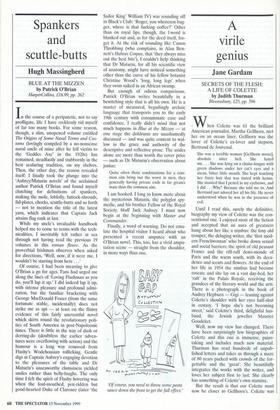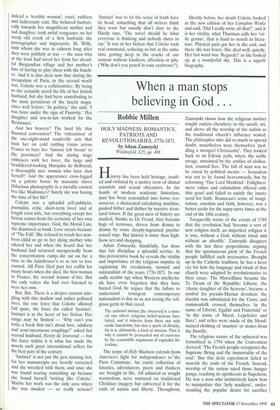A
virile genius Jane Gardam
SECRETS OF THE FLESH: A LIFE OF COLETTE by Judith Thurman Bloomsbury, £25, pp. 596
hen Colette was 61 the brilliant American journalist, Martha Gellhorn, met her on an ocean liner. Gellhom was the lover of Colette's ex-lover and stepson, Bertrand de Jouvenal.
She was a terrible woman [Gellhorn wrote],
absolute utter hell. She hated me ... She was lying on a chaise-longue with green shadows under her cat's eyes and a mean, bitter little mouth. She kept touching her frizzy hair that was tinted with henna. She insisted that I pencil in my eyebrows, and I did .. .Why? Because she told me to. And Bertrand just adored her all his life. He never understood when he was in the presence of evil.
Until I read this, surely the definitive, biography my view of Colette was the con- ventional one. I enjoyed most of the fiction and accepted that an aura of greatness hung about her like a nimbus: the foxy old trouper, the deluging writer, the 'first mod- ern Frenchwoman' who broke down sexual and social barriers; the spirit of old peasant France and the riff-raff demi-monde of Paris and the warm south, with its deca- dence and scents and flowers. At the end of her life in 1954 the nimbus had become roseate and she lay on a vast day-bed, her 'raft' in the Palais Royale, receiving the grandees of the literary world and the arts. There is a photograph in the book of Audrey Hepburn — Gigi — leaning against Colette's shoulder with her eyes half-shut in ecstasy. 'I hope she's not becoming sweet,' said Colette's third, delightful hus- band, the Jewish jeweller Maurice Goudeket.
Well, now my view has changed. There have been surprisingly few biographies of Colette and this one is immense, pains- taking and includes much new material. Thurman has read hundreds of unpub- lished letters and takes us through a maze of 80 years packed with crowds of the for- gettable and the 'great'. She beautifully integrates the works with the writer, and loves her subject first to last. She clearly has something of Colette's own stamina.
But the result is that our Colette must now be closer to Gellhorn's. Colette was indeed a 'terrible woman'; cruel, ruthless and ludicrously vain. She behaved barbari- cally towards her magnificent mother and sad daughter, took awful vengeance on her seedy old crook of a first husband, the pornographer and impresario, M. Willy, with whom she was in cahoots long after they were publicly at war — the man who at the least had saved her from her dread- ful Burgundian village and her mother's fate of having to play chess with the butch- er. And it is also clear now that during the occupation of Paris, in the second world war, Colette was a collaboratrice. By being so she certainly saved the life of her Jewish husband, but she had been contributing to the most pernicious of the fascist maga- zines well before. 'In politics,' she said, 'I was born under the sign of Passivity.' Her daughter and son-in-law worked for the Resistance.
And her bravery? The hard life that flaunted convention? The 'exhaustion' of the one-night-stand vaudeville acts that took her on cold rattling trains across France to bare her 'famous left breast' to the provinces? And the daring stage embraces with her lover, the large and bewildered-looking Marquise de Belboeuf, a thoroughly nice woman who later shot herself? And the appearance cross-legged on a palette borne by muscular slaves (hilarious photograph) in a metallic conical bra like Madonna's? Surely she was having the time of her life?
Colette was a splendid self-publicist, journalist, critic, short-term lover and at length even wife, but everything except her fiction comes from the certainty of her own supreme importance. God, the Moral Law, she dismissed as bunk. Love occurs because of 'The Fall'. She refused to touch her new- born child or go to her dying mother who adored her and when she heard that her husband had returned unexpectedly from the concentration camp. she sat on for a time in the hairdresser's so as not to lose control. All Paris filed past her coffin for many hours when she died, the first woman in France, the second Jeanne d'Arc, But the only voices she had ever listened to were her own.
But. But. There is a deeper current min- gling with this shallow and rather polluted river, the one force that Colette allowed full spate, the force she called 'Instinct'. Instinct is at the heart of her fiction. Her range may be limited — 'Why can't you write a book that isn't about love, adultery and semi-incestuous couplings?' asked her second husband, Henry de Jouvenal — but the force within it is what has made the novels such great international sellers for the best part of the century.
'Instinct' is not just the pen running riot, for her manuscripts are heavily corrected and she wrestled with them, and once she was found tearing something up because she found herself 'writing like Colette'. Maybe her work was the only area where she was modest — or really serious? 'Instinct' was to let the sense of truth have its head, something that all writers think they want but usually don't dare to do. Hardy says, 'The novel should be what everyone is thinking and nobody dares to say.' It was in her fiction that Colette took real command, seducing us but at the same time getting deep in the cracks of our armour without kindness, affection or pity. ('Why don't you pencil in your eyebrows?') Shortly before her death Colette looked at the new edition of her Complete Works and said, 'Did I really write all that?', and it is her vitality, what Thurman calls her 'vir- ile genius', that is hard to match in litera- ture. Physical pain got her in the end, and there she was brave. She died well, quietly. Her last word was 'Regarde!' as she looked up at a wonderful sky. This is a superb biography.



























































































 Previous page
Previous page